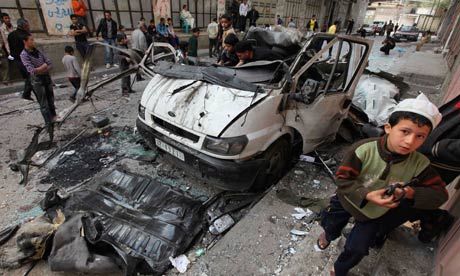Israel and Hamas step back from major Gaza confrontation
Leaders from both sides appeal for restraint after escalation of violence to levels not seen since end of Gaza war in 2009

Palestinians inspect damage caused by an Israeli air strike in Gaza - retaliation against an anti-tank missile attack on an Israeli school bus. Photograph: Mohammed Salem/Reuters
Israel and Hamas appeared to have stepped back from a major confrontation after a weekend of attacks which left 19 Palestinians dead and saw dozens of rockets fired at southern Israel.
The dead in Gaza included six civilians, with a further 65 injured.
The attacks increased after militants fired an anti-tank missile at an Israeli school bus from Gaza on Thursday, injuring a teenage boy.
Israel launched a series of air strikes and Gazan groups fired about 80 mortar shells and 20 longer-range rockets.
Leaders from both sides made radio appeals for calm and indicated that each side had no desire to escalate the conflict.
It was reported that Robert Serry, the UN special envoy for the Middle East, played a role in arranging the ceasefire, although his office would make no official comment.
Ghazi Hamad, the deputy foreign minister in the Gaza government, gave a rare interview on Israeli radio to appeal for calm.
Speaking in fluent Hebrew, which he learnt while imprisoned by Israel, he said that Hamas would cease its attacks if Israel halted its military operations against Gaza.
"We are interested in calm but want the Israeli military to stop its operations," said Hamad.
A succession of Israeli ministers also appeared on radio calling for calm, but also threatening retaliation for any attacks from Gaza.
Binyamin Netanyahu, the Israeli prime minister, told his weekly cabinet meeting: "The Israel defence forces hit Hamas and the terrorist organisation hard over the weekend.
"If attacks against Israeli civilians and the Israel defence forces continue, the response will be most harsh."
Violence between Hamas and Israel has escalated since the end of March, reaching levels not seen since the Gaza war which ended in January 2009.
Ashkelon and other towns near the Gaza Strip have seen schools closed and life disrupted by the threat of rockets.
Each time a rocket is detected, residents are warned with messages relayed by loudspeaker which gives them time to take cover. In prolonged attacks, residents take shelter in strongrooms and bomb shelters.
On Sunday, industrial estates were operating normally, shops were open and children were walking home from school.
The effect of rocket fire has been reduced by the success of Israel's Iron Dome missile defence system, which since it was first used last week has destroyed nine rockets in mid-flight.
There are two batteries, one stationed near Be'er Sheva, east of Gaza, and one near Ashkelon, north of Gaza.
The army insists that the system is still experimental, but it is expected to revolutionise Israel's defences against short-range rockets when it is fully developed.
In one of its own attacks, Israel claimed to have killed Tayseer Abu Snima, who it said was involved in the kidnapping of Israeli soldier Gilad Shalit in 2006.
No comments:
Post a Comment